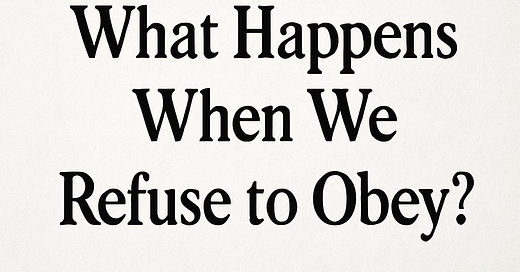Obedience is one of the most celebrated virtues in authoritarian religion.
It’s framed as faithfulness, humility, submission to a higher power.
But often, what’s called “obedience” is just compliance with control.
Obedience is how the system keeps you quiet.
It’s how it makes you doubt your own insight, ignore your own pain, suppress your own voice.
And when obedience is demanded—
even when it harms you, silences others, or protects injustice—
then disobedience becomes sacred.
To refuse isn’t to rebel against God.
It’s to say: “You will not use God to destroy me.”
The Idolatry of Obedience
Obedience is supposed to be a tool of trust.
But under Christian Nationalism, it becomes an idol.
You're not taught to discern—you’re taught to submit.
Submit to church authority.
Submit to your husband.
Submit to the state (as long as it serves your faith).
Submit to God’s “natural order.”
Submit even when it breaks you.
Obedience becomes the test of righteousness.
Not whether you loved.
Not whether you listened.
But whether you complied.
Questioning is rebellion.
Doubt is disobedience.
Conscience is suspicion.
You’re told that to follow your heart is to betray God.
Even if your heart is weeping for justice.
Even if your soul is screaming for truth.
Holy Disobedience
Throughout scripture and history, the most sacred acts weren’t blind obedience.
They were the refusals that honored conscience, compassion, and justice.
The midwives in Exodus who refused to kill the Hebrew babies.
Jesus healing on the Sabbath.
Peter saying, “We must obey God rather than men.”
Civil rights leaders marching in “illegal” protests.
Whistleblowers, survivors, and truth-tellers who stood against injustice
even when the church said: “Be quiet and obey.”
I didn’t always see it that way.
For most of my early life, I was taught that obedience to the commandments was everything.
Obey the rules.
Don’t sin.
Don’t question.
It was a theology of fear.
And for a neurodivergent kid who took things literally—
that fear turned into trauma.
Every decision felt like a moral minefield.
Every thought could be wrong.
Every action might offend God.
And I wouldn’t know until it was too late.
It wasn’t about how I loved.
It was about how well I followed the rules—
rules I didn’t make, didn’t understand, and couldn’t question.
The shift came when I stopped obsessing over the commandments
and started living the Beatitudes.
Blessed are the poor in spirit.
Blessed are the meek.
Blessed are the peacemakers.
Blessed are the persecuted for the sake of justice.
The commandments gave me fear.
The Beatitudes gave me life.
They weren’t threats.
They were invitations to become more human.
They called me not to comply,
but to care.
Not to submit,
but to stand with.
Not to disappear,
but to be present.
Holy disobedience isn’t about rebellion for its own sake.
It’s about refusing to betray what is sacred inside you—
even when obedience would be easier.
How Systems Respond to Refusal
Systems built on obedience don’t quietly accept disobedience.
They punish it—loudly.
Because your refusal isn’t just a personal act.
It’s a threat to the illusion of control.
If you can say no…
maybe others will too.
And that cannot be allowed.
So they respond with force, shame, or silence.
Force if they can make you afraid—arrests, lawsuits, custody battles, violence.
Shame if they can make you doubt—gaslighting, public condemnation, social exclusion.
Silence if they want to erase you—excommunication, firing, ghosting, pretending you never existed.
I’ve experienced all of these.
Every time I broke away—
from the marriage, the church, the worldview I was told was the only truth—
there was punishment.
They tried to sabotage my dreams.
They warned me.
They threatened me.
They made me feel like the ungrateful one, the disobedient one, the dangerous one.
But none of that made them stronger.
It just made their fear visible.
Because if obedience is your foundation,
and someone walks away without collapsing—
then your whole system is exposed.
You can no longer say: “This is the only way.”
You can only say: “This is the way we use to keep people here.”
When Refusal Becomes Freedom
There’s a moment—if you’re lucky—
when the shame starts to crack.
When you stop asking for permission.
When you stop hoping they’ll understand.
When you stop trying to make it make sense
to people who were never listening.
And in that moment…
the fear begins to lift.
You realize you’re not evil.
You’re not broken.
You’re not alone.
You’re awake.
You’re finally living from within—
instead of being policed from without.
And that doesn’t mean the danger disappears.
But you’re no longer dying to be accepted
by a system that would rather see you disappear.
This is the kind of freedom they can’t understand.
Because they only know freedom as the reward for obedience.
Not as the result of walking away.
But some of us only come alive
when we finally, faithfully, say:
No more.
NEXT - When Mercy Is the System: Designing a World Without Sacrifice




